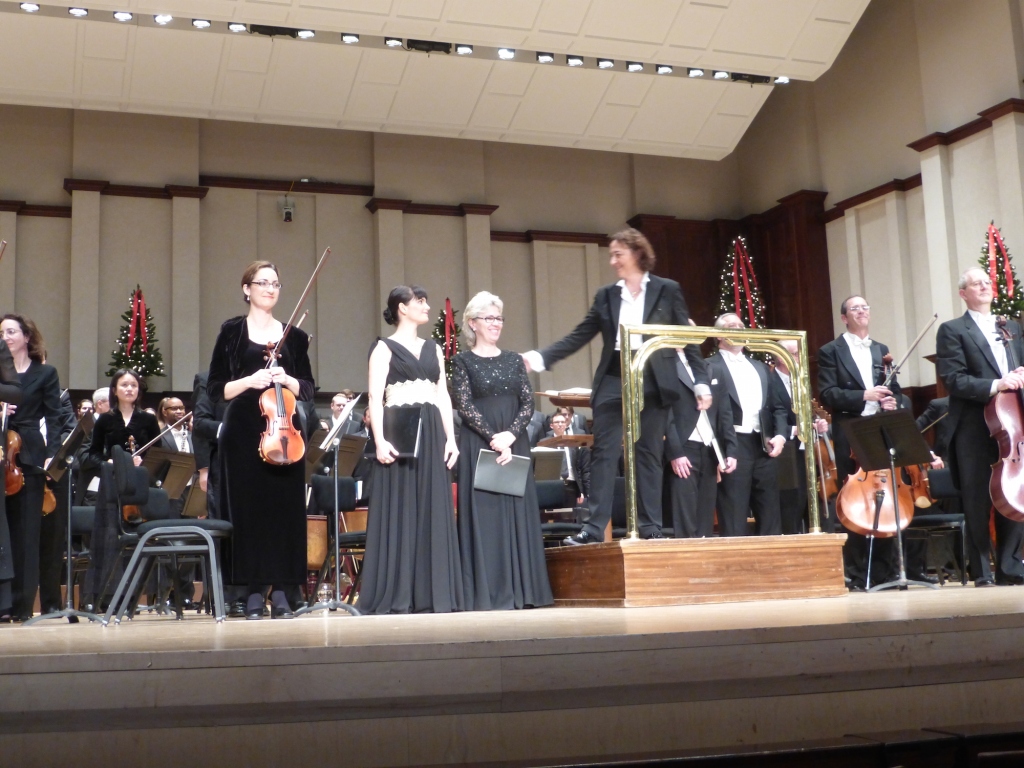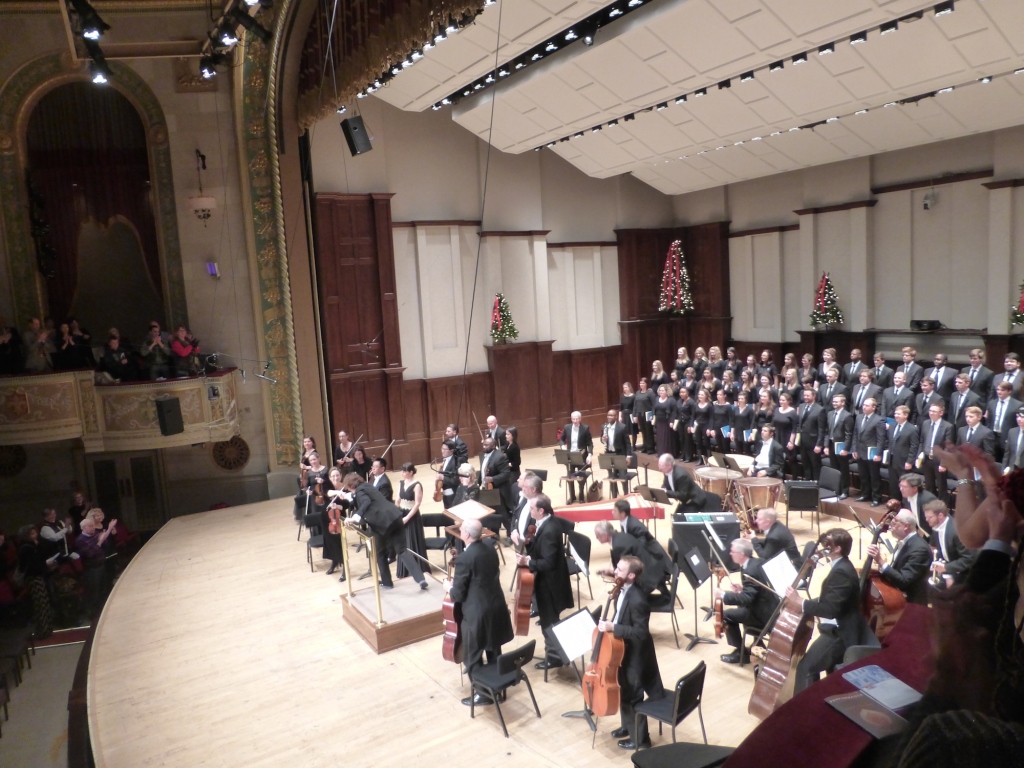Händel’s “Messiah”
Nathalie Stutzmann, conductor
Emöke Barath, soprano
Sara Mingardo, contralto
Lawrence Wiliford, tenor
Stephen Powell, baritone
Michigan State University Chorale
Saturday December 12, 2015, Orchestra Hall, Detroit
I am very glad to have seen Nathalie Stutzmann with her own orchestra last year in Metz and Paris conducting this piece as it provides somewhat a reference for exactly how she wanted to shape it and for “comparison” of how things sound with a modern orchestra and different chorus. The strongest impression is her interaction with the quite large chorus to create the dynamics and bring out the chorus energy. Simply an incredible sight to watch! Especially in the 2nd and 3rd parts where choral music is dominant, their intertwined music lines and intensities were completely in sync with her direction. That there is such a clear dynamic response from the chorus made that from the orchestra to her conducting a bit “puzzling”. At times one (I) can feel she wanted certain dynamics (with her body + arm movements) but orchestra’s reaction was at a slightly “buffered” rate**. Whatever that buffered rate was, she prevailed in the end to bring out the dynamics in the orchestra and the audience could hear well her phasing/shaping/vision. This became especially clear after the “halleluja”: she was *very* focus, highly engaging, dripping in sweat, chorus pumping with energy + power, orchestra finally clicking on all cylinders, the audience leaping to their feet clapping and cheering. Very spontaneous, befitting the energy she built up! With all in proper gears, the chorus gained further energy to finish in style with a triumphant “Amen”. Nathalie smiled, thanking the first violinist, the first cellist, trumpet-player, the chorus, and her soloists before taking the final bow for the night.
But what about the soloists you ask! They were very good! The tenor, Lawrence Wiliford, was quite expressive right out of the gate. In fact he was already quite into it from watching Natalie during the overture! Much more descriptive than the one I heard in Paris/Metz (to my ears). Sara Mingardo: i was smiling a bit sitting so close hearing her warm and expressive voice, emphasis on expressive. But this is also where I noticed the contrast in the reaction of the orchestra to N.Stutzmann’s gestures: it was not building the tension as I have heard in France, and as a result it didn’t bring out the same dynamics + tensions in “But who may abide” and especially in “o thou that tellest good tidings to zion”. In the 2nd one, she (SM) did her part of the phrasing but orchestra didn’t quite match so tension was somewhat built and diffused**. What was really enjoyable was her duet with the tenor because there they responded to each other emphasis by emphasis, phrase by phrase, crescendo by crescendo, and you (or I) in the audience feel it immediately. Also her voice stood out quite well in the duet, very pleasant to hear!

Emöke Barath: I quite like the tone of her voice! very expressive and a bit less sugar-sweet than S.Gritton (I prefer less sugar). Some of the phrasings I really enjoyed, especially the last aria “i know that my redemmer liveth” where with the orchestra finally clicking with N.Stutzmann direction they together provided a complete “feel” for what I was hoping for right from the start***. The baritone was quite good as well, i would have liked even a bit more interaction (musically with the trumpet) during the trumpet scene as it “appeared” he might be reading the music sheet too much (but he generously stepped in for the scheduled baritone so that might have been it).

Oh, I was gonna wrap up, until I remember, yes! phrasing! the orchestra: N.Stutzmann stripped the orchestra “clean” (7 violins + 2 violas i think, then 4 cellos, and woodwinds + trumpets + bassoon + percussion AND a harpsichord, the harpsichord looks a bit quite out of place 🙂 ) such that all singers were heard VERY WELL and very well supported, with orchestra swooping in in waves to fill the void as soon as a singing line stopped. Just so enjoyable to hear! and oh yes, in the 2nd half I nicely upgraded myself to box1 with a much clearer view + sound of the chorus, and thus the super enjoyable view of N.Stutzmann’s interaction with them! very rewarding to have them responding immediately to her cue i’m sure :). that chorus was full of “youth” energy! A little bit on her phrasings: the tempo was quite brisk at times with crescendo to build the tension and release and yet at other times coming to a halt stretching with only 1 instrument accompanying the singer to allow for full vocal expression (without being covered). Particularly evident was when S.Mingardo was delivering her lines. Very unique! sort of putting to front and center what is the most important message at each time! I’ll pay more attention to the orchestra’s phrasing tomorrow and report! signing off until perhaps next week, as i will be on the run quite a bit after tonight!
—–
A side note: in the first half I was curious if the “buffered” reaction might have been because it’s a modern orchestra, one which she stripped down to very thin. The violins in particular sounded a bit “dry”, sort of like my throat now after a cold (can’t sing soft, edgy in the middle). What i mean is comparing to the baroque strings, somehow the “warmth” and “softness” were missing at the high notes such that one feels they can’t do high + pianissimo building up to forte; instead the first volume is “5”). This could entirely be due to my seat in the 3rd row (?) though i do not think so because I have sat before in front of baroque violins and didn’t feel this. Anyhow, at intermission I met up with another N.Stutzmann’s fan and got a bit more info on where the “buffered” reaction might have come from.
Onto the various stars / footnote markers: I overheard that N.Stutzmann faced resistance within some members of the orchestra which made the environment tense and frustrating. It was along the line of her shaping of the music not to their liking, which I will interpret as the usual way of just playing Messiah 20x a season without phrasing.. And if you read my post last year of my comment on how
she filled my complete needs
, I hope those who resisted heard how the audience reacted to her shaping of the Messiah tonight (check out the clip above, comments include dynamics being “very different” and exciting compared to what they usually hear, with things moving along at good pace but yet with full details and contrasting tempo when needed, how powerful and “abrupt”/precise the chorus was..) and gained more appreciation for what it means to have a vision to shape the music to bring out ideas. This is what makes her special and unique and addictive to listen to! And I hope N.Stutzmann has a good rest tonight after all her hard work because we in the audience heard well how she envisioned it! Post-concert I sat in the empty hall discussed enthusiastically with her other fan on the concept of musical shaping and expression. I’m curious how it will sound tomorrow, as well as in DC with yet a different orchestra. I hope they will enjoy their time making music together. What was clear though is that the singers she chose, S.Mingardo, E.Barath, and L.Wiliford specifically, their phrasings matched well together and with N.Stutzmann’s and they alone were also able to bring out a significant portion of the music.

Leave a reply to stray Cancel reply